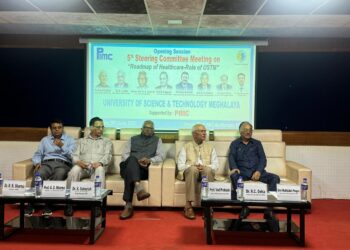9th Mile, Khanapara, Ri Bhoi, November 6, 2023: Nearly 60 Vice Chancellors from 22 state public universities of India assembled at a meeting recently held in New Delhi for a consultation on expanding quality Higher education where Prof GD Sharma, Vice Chancellor of the University of Science and Technology Meghalaya, and President of the Association of Indian Universities (AIU) News Delhi emphasized on implementation of the National Education Policy 2020 in its true spirit. The meeting was organised by Niti Aayog on 2nd November under a state support mission in collaboration with the Association of Indian Universities.
During the Inaugural session, Professor Gauri Dutt Sharma spoke on the challenges and issues before State public universities and affiliated colleges in achieving quality of education to compete globally. Other dignitaries who addressed during the Inaugural session were Dr Vinod Kumar Paul, Member Niti Aayog, Professor M. Jagadish Kumar, Chairman of University Grants Commission, Dr Vijay Kumar Saraswat member Niti Aayog, Shri Suman Bery Vice Chairman Niti Aayog. Different aspects like quality, financing, governance, and employability were presented during the meeting. Dr Pankaj Mittal, Secretary General of AIU extended support to the Vice Chancellors in capacity building and technology enhancement.
In his address, Prof Sharma said, “The concerted efforts involving governmental support, collaboration between institutions to share resources, and solving problems of industry will elevate the quality of higher education. The successful implementation of NEP 2020 using multidisciplinary skilled collaborative flexible application-oriented innovative pedagogy and Technological application will help in enhancing innovation and quality research”.
He emphasized that faculty shortage, outdated curriculum content, autonomy constraints, high student enrollment in affiliated colleges, and imbalanced funding are major challenges to compete at the international level. This ultimately affects the employability of students. Students as the primary beneficiaries of these universities often bear the brunt of these challenges, and face hurdles in accessing quality education and global opportunities. Improvement in physical infrastructure, academic autonomy, and internationalization efforts are needed to prepare students for the globalized world and enhance the relevance of Indian education.









